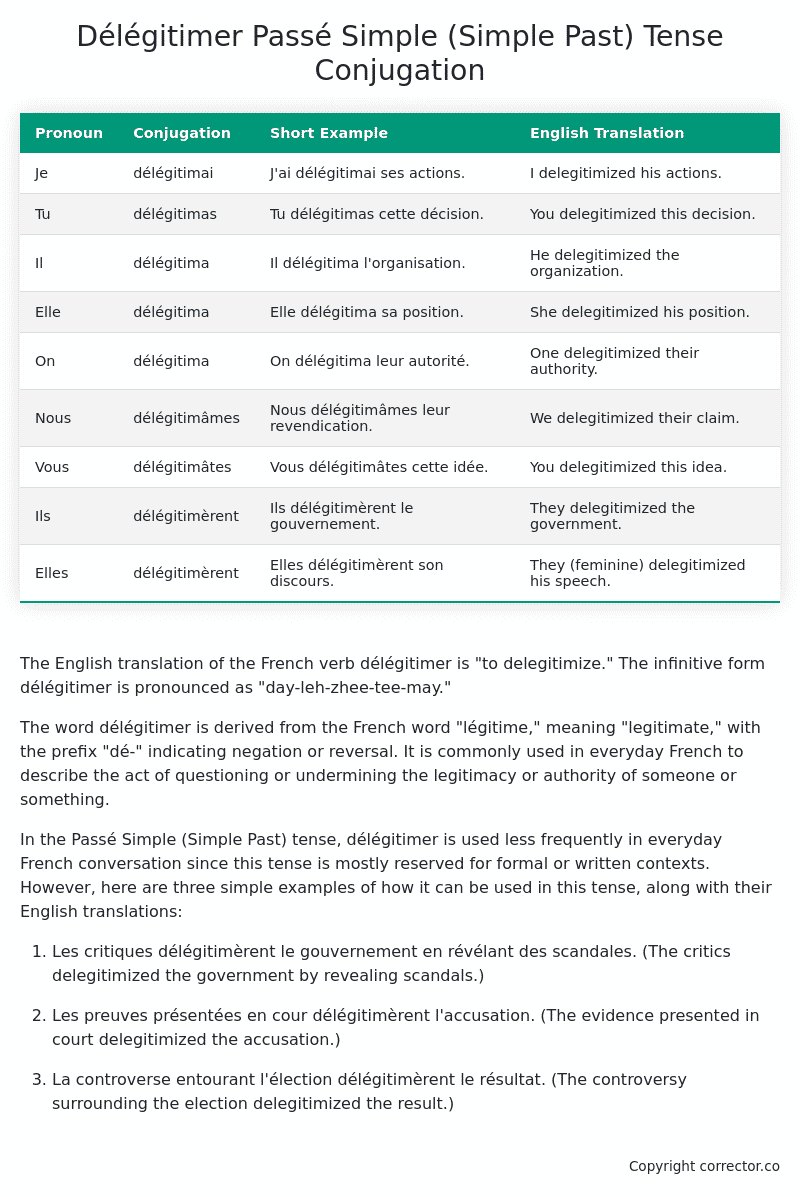Passé Simple (Simple Past) Tense Conjugation of the French Verb délégitimer
Introduction to the verb délégitimer
The English translation of the French verb délégitimer is “to delegitimize.” The infinitive form délégitimer is pronounced as “day-leh-zhee-tee-may.”
The word délégitimer is derived from the French word “légitime,” meaning “legitimate,” with the prefix “dé-” indicating negation or reversal. It is commonly used in everyday French to describe the act of questioning or undermining the legitimacy or authority of someone or something.
In the Passé Simple (Simple Past) tense, délégitimer is used less frequently in everyday French conversation since this tense is mostly reserved for formal or written contexts. However, here are three simple examples of how it can be used in this tense, along with their English translations:
-
Les critiques délégitimèrent le gouvernement en révélant des scandales.
(The critics delegitimized the government by revealing scandals.) -
Les preuves présentées en cour délégitimèrent l’accusation.
(The evidence presented in court delegitimized the accusation.) -
La controverse entourant l’élection délégitimèrent le résultat.
(The controversy surrounding the election delegitimized the result.)
Table of the Passé Simple (Simple Past) Tense Conjugation of délégitimer
| Pronoun | Conjugation | Short Example | English Translation |
|---|---|---|---|
| Je | délégitimai | J’ai délégitimai ses actions. | I delegitimized his actions. |
| Tu | délégitimas | Tu délégitimas cette décision. | You delegitimized this decision. |
| Il | délégitima | Il délégitima l’organisation. | He delegitimized the organization. |
| Elle | délégitima | Elle délégitima sa position. | She delegitimized his position. |
| On | délégitima | On délégitima leur autorité. | One delegitimized their authority. |
| Nous | délégitimâmes | Nous délégitimâmes leur revendication. | We delegitimized their claim. |
| Vous | délégitimâtes | Vous délégitimâtes cette idée. | You delegitimized this idea. |
| Ils | délégitimèrent | Ils délégitimèrent le gouvernement. | They delegitimized the government. |
| Elles | délégitimèrent | Elles délégitimèrent son discours. | They (feminine) delegitimized his speech. |
Other Conjugations for Délégitimer.
Le Present (Present Tense) Conjugation of the French Verb délégitimer
Imparfait (Imperfect) Tense Conjugation of the French Verb délégitimer
Passé Simple (Simple Past) Tense Conjugation of the French Verb délégitimer (You’re reading it right now!)
Passé Composé (Present Perfect) Tense Conjugation of the French Verb délégitimer
Futur Simple (Simple Future) Tense Conjugation of the French Verb délégitimer
Futur Proche (Near Future) Tense Conjugation of the French Verb délégitimer
Plus-que-parfait (Pluperfect) Tense Conjugation of the French Verb délégitimer
Passé Antérieur (Past Anterior) Tense Conjugation of the French Verb délégitimer
Futur Antérieur (Future Anterior) Tense Conjugation of the French Verb délégitimer
Subjonctif Présent (Subjunctive Present) Tense Conjugation of the French Verb délégitimer
Subjonctif Passé (Subjunctive Past) Tense Conjugation of the French Verb délégitimer
Subjonctif Imparfait (Subjunctive Imperfect) Tense Conjugation of the French Verb délégitimer
Conditionnel Présent (Conditional Present) Tense Conjugation of the French Verb délégitimer
Conditionnel Passé (Conditional Past) Tense Conjugation of the French Verb délégitimer
Conditionnel Passé II (Conditional Past II) Tense Conjugation of the French Verb délégitimer
L’impératif Présent (Imperative Present) Tense Conjugation of the French Verb délégitimer
L’impératif Passé (Imperative Past) Tense Conjugation of the French Verb délégitimer
L’infinitif Présent (Infinitive Present) Tense Conjugation of the French Verb délégitimer
L’infinitif Passé (Infinitive Past) Tense Conjugation of the French Verb délégitimer
Le Participe Présent (Present Participle) Tense Conjugation of the French Verb délégitimer
Le Participe Passé (Past Participle) Tense Conjugation of the French Verb délégitimer
Struggling with French verbs or the language in general? Why not use our free French Grammar Checker – no registration required!
Get a FREE Download Study Sheet of this Conjugation 🔥
Simply right click the image below, click “save image” and get your free reference for the délégitimer Passé Simple tense conjugation!

Délégitimer – About the French Passé Simple (Simple Past) Tense
Formation
Usage
Narration
Historical Context
Interactions with other tenses
Passé Composé
Imparfait
Conditional and Subjunctive
Summary
I hope you enjoyed this article on the verb délégitimer. Still in a learning mood? Check out another TOTALLY random French verb conjugation!


